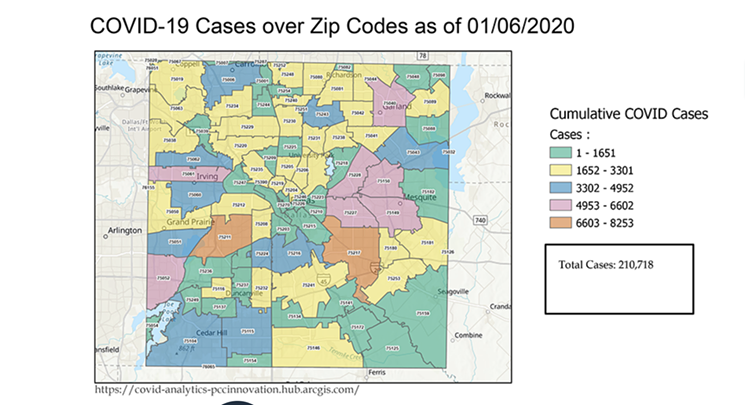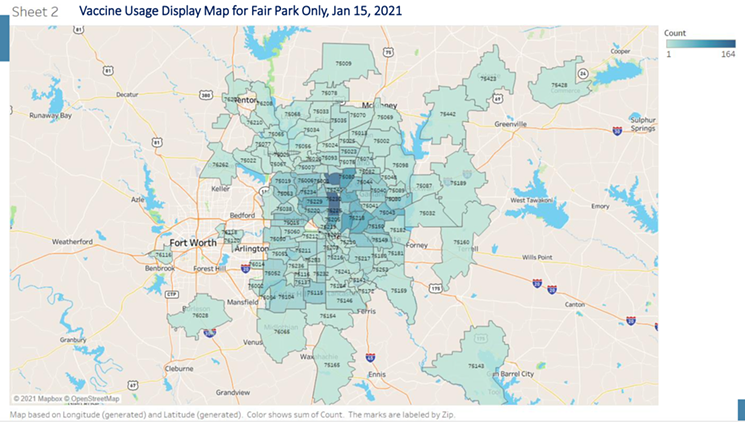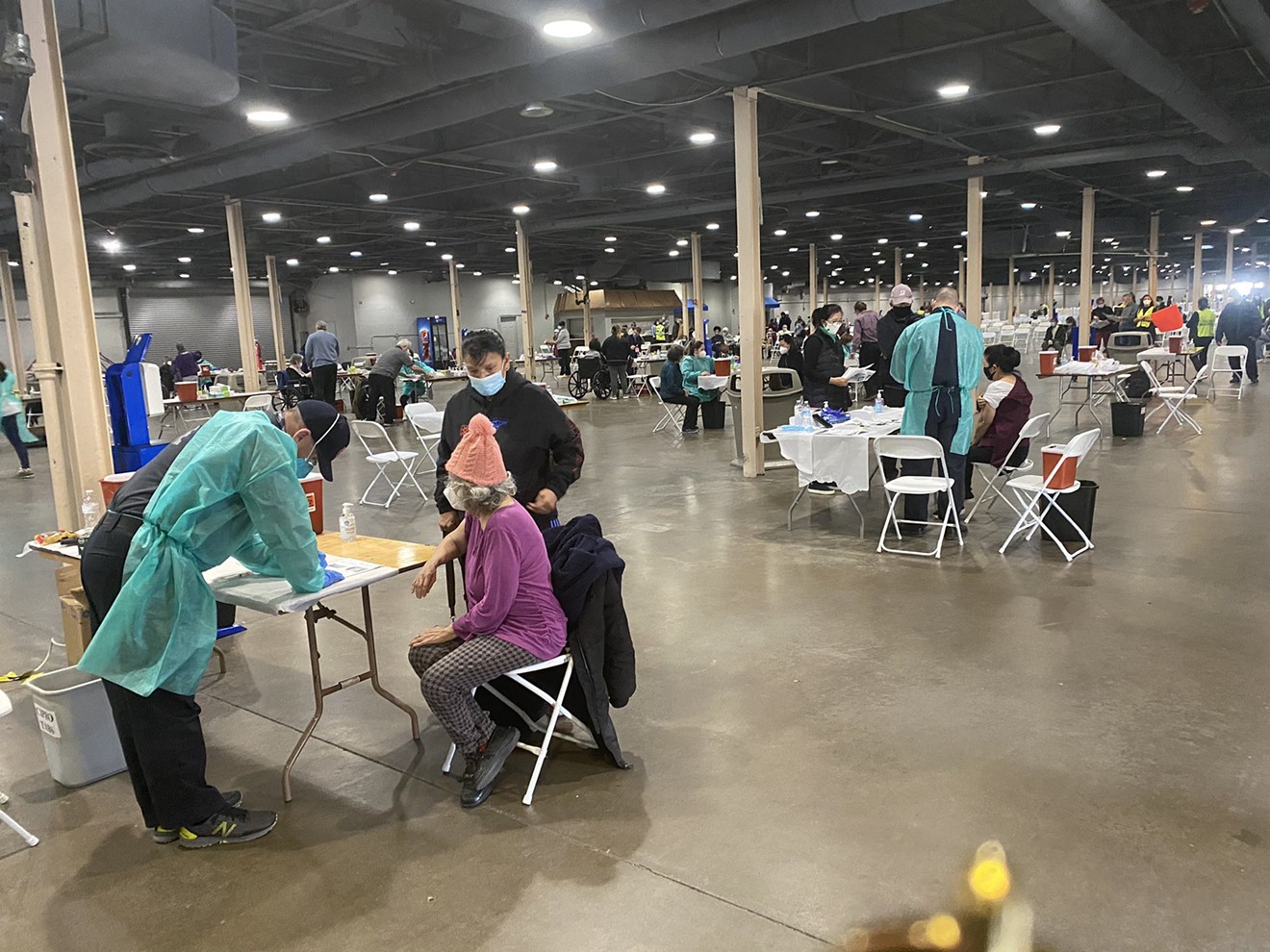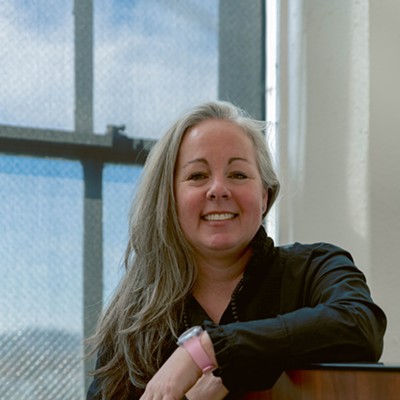After a few days of running a mega vaccine center, some lessons were learned. A big one was that left to our own devices, there will be continued inequity of the distribution of medical care. A county proposal to alleviate that problem was shot down this week by the state.

This map shows cumulative COVID-19 cases; the hardest-hit communities aren't the ones who received vaccines, despite the mega-center being in their neighborhood.
Dallas County Health and Human Services
So, they built it, but in this case, they didn’t come.

Last week when the county's vaccine hub went to first-come-first-serve, North Dallas residents headed south to Fair Park to get their shots.
Dallas County Health and Human Services
As County Judge Clay Jenkins points out, with the first-come-first-serve model, despite the fact that the mega center is placed south of Interstate 30, those with the fastest cars, internet connections and resources made their way to center quickest.
But, vaccinating the Black communities of south Dallas is a complicated issue.
“The fact that it [the mega center] is in the neighborhood doesn’t mean it’s for the neighborhood,” Pastor Chris Simmons of Cornerstone Baptist Church told the Observer last week.
Simmons says the history of government involvement in the neighborhood is going to make the vaccine a hard sell. Even the fact that the center is at Fair Park, a property acquired through the enforcement of eminent domain policies, he says, "adds insult to injury. That lack of trust will make community buy-in very difficult.
“This distrust goes all the way back to Tuskegee experiments, and the current political climate certainly doesn’t help," Simmons says.
When Jenkins and the medical community were at Fair Park last week and realized their plan of reaching the communities of southern Dallas wasn't going as they hoped, they reached out to community leaders to put the word out about the center, but that led Mayor Eric Johnson to complain they county was acting without informing its partners. By Saturday, the center went back to appointments only. This way they were able to better control who, exactly, was in line for the vaccine.
They also learned that they could vaccinate the same number of people in the same amount of time but the wait times were drastically reduced, from five hours to two, when patients were given a window of when to arrive.
So, this past Tuesday the commissioners court discussed how to ensure an equitable distribution of the vaccine. Moving forward, Dallas County has proposed sorting the 300,000 people who had registered for the shot by ZIP code, prioritizing the most vulnerable populations.
The targeted ZIP codes include: 75150, 75204, 75211, 75216, 75227, 75228, 75243, 75210, 75217, 75241, 75149, 75150, 75215 and 75228.
This ZIP code allotment wouldn't apply to all the vaccines received by Dallas County, only those assigned to the hub. Last week that was 9,000 of 37,000 total doses (24%). The other 76% went to other medical facilities.
The big idea is to ensure the Fair Park hub is serving those most vulnerable communities while other ZIP codes work through their doctors or hospitals, or "medical homes."
Since Fair Park is a "state hub," Jenkins sent a letter to John Hellerstedt, commissioner of health at the Texas Department of State Health Services, detailing this plan.
"(...) it requires that everyone who registers as a 1B from eleven zip codes be given an opportunity to schedule an appointment for a COVID-19 vaccine before anyone outside of those zip codes is allowed an opportunity to schedule an appointment," wrote Jenkins, referring to the second tranche of people eligible to receive a vaccine now.
The state responded that if the county wants the center to continue to be a hub, it cannot allocate vaccines solely based on ZIP codes. Hubs are required by the state to distribute shots to anyone in the state and do not allow for inequality tools, though one of the state's goals is to do an equitable distribution among ZIP codes and demographic groups.
Imelda Garcia, associate commissioner of the Laboratory & Infectious Disease Services Division with the state responded to Jenkins' request, writing, "While we ask hub providers to ensure vaccine reaches the hardest hit areas and populations, solely vaccinating people who live in those areas is not in line with the agreement to be a hub provider."
Dallas County will have to go back to the drawing board, perhaps devising a plan that includes some but not all of the most vulnerable populations.












